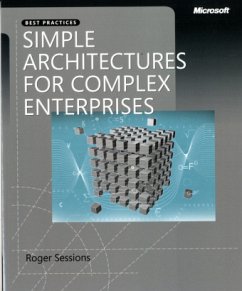Dismantle the overwhelming complexity in your IT projects with strategies and real-world examples from a leading expert on enterprise architecture. This guide describes best practices for creating an efficient IT organization that consistently delivers on time, on budget, and in line with business needs.
IT systems have become too complex—and too expensive. Complexity can create delays, cost overruns, and outcomes that do not meet business requirements. The resulting losses can impact your entire company. This guide demonstrates that, contrary to popular belief, complex problems demand simple solutions. The author believes that 50 percent of the complexity of a typical IT project can and should be eliminated—and he shows you how to do it.
You’ll learn a model for understanding complexity, the three tenets of complexity control, and how to apply specific techniques such as checking architectures for validity. Find out how the author’s methodology could have saved a real-world IT project that went off track, and ways to implement his solutions in a variety of situations.
Product Description
Dismantle the overwhelming complexity in your IT projects with strategies and real-world examples from a leading expert on enterprise architecture. This guide describes best practices for creating an efficient IT organization that consistently delivers on time, on budget, and in line with business needs.
IT systems have become too complex—and too expensive. Complexity can create delays, cost overruns, and outcomes that do not meet business requirements. The resulting losses can impact your entire company. This guide demonstrates that, contrary to popular belief, complex problems demand simple solutions. The author believes that 50 percent of the complexity of a typical IT project can and should be eliminated—and he shows you how to do it.
You’ll learn a model for understanding complexity, the three tenets of complexity control, and how to apply specific techniques such as checking architectures for validity. Find out how the author’s methodology could have saved a real-world IT project that went off track, and ways to implement his solutions in a variety of situations.
Dedication
Acknowledgments
Introduction
The Question of Complexity
Chapter 1: Enterprise Architecture Today
Chapter 2: A First Look at Complexity
Chapter 3: Mathematics of Complexity
The Quest for Simplification
Chapter 4: The ABCs of Enterprise Partitions
Chapter 5: SIP Process
Chapter 6: A Case Study in Complexity
Chapter 7: Guarding the Boundaries: Software Fortresses
Chapter 8: The Path Forward
This Book at a Glance
Author Biography
IT systems have become too complex—and too expensive. Complexity can create delays, cost overruns, and outcomes that do not meet business requirements. The resulting losses can impact your entire company. This guide demonstrates that, contrary to popular belief, complex problems demand simple solutions. The author believes that 50 percent of the complexity of a typical IT project can and should be eliminated—and he shows you how to do it.
You’ll learn a model for understanding complexity, the three tenets of complexity control, and how to apply specific techniques such as checking architectures for validity. Find out how the author’s methodology could have saved a real-world IT project that went off track, and ways to implement his solutions in a variety of situations.
Product Description
Dismantle the overwhelming complexity in your IT projects with strategies and real-world examples from a leading expert on enterprise architecture. This guide describes best practices for creating an efficient IT organization that consistently delivers on time, on budget, and in line with business needs.
IT systems have become too complex—and too expensive. Complexity can create delays, cost overruns, and outcomes that do not meet business requirements. The resulting losses can impact your entire company. This guide demonstrates that, contrary to popular belief, complex problems demand simple solutions. The author believes that 50 percent of the complexity of a typical IT project can and should be eliminated—and he shows you how to do it.
You’ll learn a model for understanding complexity, the three tenets of complexity control, and how to apply specific techniques such as checking architectures for validity. Find out how the author’s methodology could have saved a real-world IT project that went off track, and ways to implement his solutions in a variety of situations.
Dedication
Acknowledgments
Introduction
The Question of Complexity
Chapter 1: Enterprise Architecture Today
Chapter 2: A First Look at Complexity
Chapter 3: Mathematics of Complexity
The Quest for Simplification
Chapter 4: The ABCs of Enterprise Partitions
Chapter 5: SIP Process
Chapter 6: A Case Study in Complexity
Chapter 7: Guarding the Boundaries: Software Fortresses
Chapter 8: The Path Forward
This Book at a Glance
Author Biography






